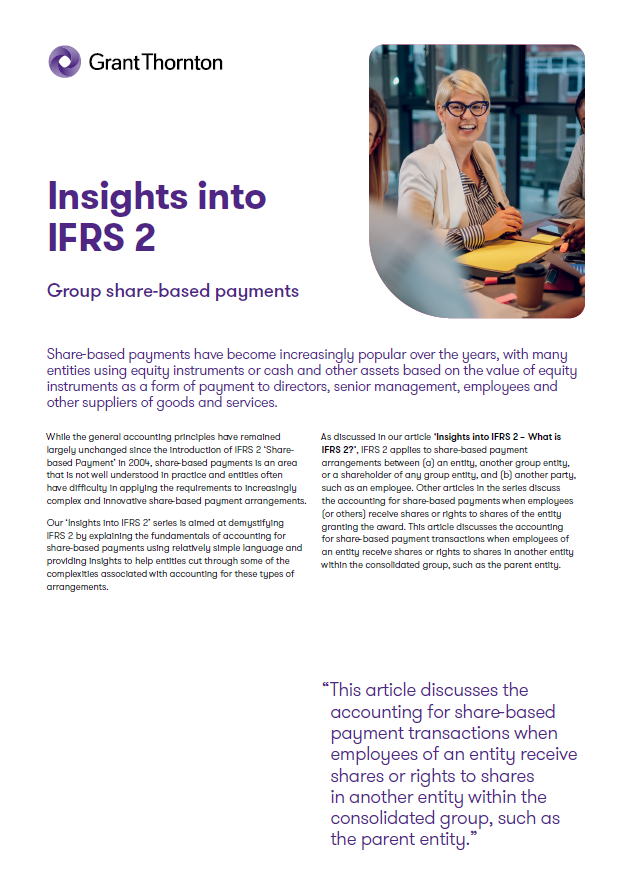

Group share-based payments
Download this article for the full insights into accounting for group share-based payment arrangements.
This article discusses the accounting for share-based payment transactions when employees of an entity receive shares or rights to shares in another entity within the consolidated group, such as the parent entity.
Group share-based payment arrangements
Share-based payment arrangements are commonly agreements between an entity and its employees, where the employees receive either (1) the entity’s own equity instruments or (2) payments based on the share price of the entity’s own equity instruments. However, in some cases, share-based payment arrangements may involve another group entity or a shareholder of any group entity.
For example, a share-based payment arrangement may be entered into with the employees of one entity, but another group entity or shareholder of another group entity is responsible for settling the obligation associated with the share-based payment transaction. In other words, the entity receiving the services from the employee is not always the entity that is responsible for settling the share-based payment transaction.
To determine whether an agreement represents a group share-based payment arrangement that is within the scope of IFRS 2, it is also important to understand what a ‘group’ is and which entities or parties should be considered. IFRS 2 refers to the guidance in IFRS 10 ‘Consolidated financial statements’.
This definition is determined from the perspective of the reporting entity’s ultimate parent. For example, in the organisational structure shown below in Figure 1, the group includes the ultimate parent (UP), and all of its subsidiaries. In Figure 1, the following are two examples of share-based payment arrangements that would fall under the scope of IFRS 2:
- Example 1: UP grants a share-based payment award, to be settled in its own equity instruments, to the employees of Subsidiary C (SC).
- Example 2: Subsidiary A (SA) grants a share-based payment award to its employees, that will be settled in the equity instruments of Subsidiary X (SX).

When determining whether a transaction is within the scope of IFRS 2, it is also necessary to consider the financial statements in which the share-based payment transaction is being recorded.
In other words, is the arrangement being assessed from the perspective of the consolidated financial statements of the entire group, or is the arrangement being assessed from the perspective of the separate financial statements of one entity involved in the group share-based payment transaction?
In Figure 1 above, both examples are share-based payment transactions that would be recognised in the consolidated financial statements of UP, because the consolidated entity is receiving services and settling the transaction in its own equity instruments. In addition:
- Example 1: The transaction between UP and SC is a group share-based payment that would also be recognised in the separate financial statements of both UP and SC, because the settling and receiving entity are in the same group.
- Example 2: The transaction between SX and SA is a group share-based payment that would also be recognised in the separate financial statements of both SX and SA, because they are entities in the same group (from the perspective of the UP).
How is a group share-based payment arrangement accounted for?
As mentioned in our article, ‘Insights into IFRS 2 – Classification of share-based payment transactions and vesting conditions,’ [i] to determine the appropriate accounting treatment, share-based payment transactions must be classified as either an equity-settled transaction or a cash-settled transaction. The classification of group share-based payment transactions requires an entity to assess:
(a) the nature of the awards granted, and
(b) its own rights and obligations.
The classification depends on whether the assessment is made from the perspective of the group entity receiving the goods or services or the group entity settling the share-based payment transaction. This is an important concept when it comes to dealing with group share-based payments as the amount recognised by the entity receiving the goods or services may differ from the amount recognised by the consolidated group or by another group entity settling the share-based payment transaction.
Receiving entity
The entity receiving the goods or services (the receiving entity) measures the goods or services received as an equity-settled share-based payment transaction when:
(a) the awards granted are its own equity instruments, or
(b) the entity has no obligation to settle the share-based payment transaction.
In all other circumstances, the receiving entity measures the goods or services received as a cash-settled share-based payment transaction. For example, if a subsidiary grants a share-based payment award to its employees that will be settled in the equity of its parent, and the subsidiary is responsible for settling the award, then the subsidiary will classify the transaction as cash-settled because (a) it is obligated to settle the award and (b) the award will not be settled in the subsidiary’s own equity but in the equity of its parent.
All of the terms and conditions of an arrangement must be considered when determining its classification. For example, a grant of shares that are redeemable either mandatorily or at the employee’s option is a cash-settled share-based payment arrangement because the entity may be obligated to ultimately settle in cash.
Another scenario is where an entity, at the time of granting an award to be settled in its own equity instruments to its employees, simultaneously issues those employees put options to sell the shares back to the entity (ie as a liquidity option for the employees). The existence of a cash alternative affects the classification of such arrangements (see ‘Insights into IFRS 2 – Classification of share-based payment transactions and vesting conditions’ [ii] for assessing cash alternatives).
Settling entity
The entity settling a share-based payment transaction when another entity in the group receives the goods or services (the settling entity) recognises the transaction as an equity-settled share-based payment transaction only if it is settled in the entity’s own equity instruments. Otherwise, the transaction should be recognised as a cash-settled share-based payment transaction.
Once the group share-based payment transactions are classified as either equity-settled or cash-settled transactions, the accounting follows the methods described in our article, ‘Insights into IFRS 2 – Equity-settled share-based payment arrangements with employees' [iii] and our upcoming article, 'Insights into IFRS 2 - Cash-settled share-based payment arrangements with employees.'
How does an entity account for intragroup repayment arrangements?
Some group transactions include repayment arrangements in which one group entity is required to pay another group entity for providing share-based payments to its employees. For example, a parent company may charge a subsidiary for the equity instruments or cash that it provided to the subsidiary’s employees. In these situations, the receiving entity accounts for the share-based payment transaction in accordance with the guidance discussed above, regardless of whether an intragroup repayment arrangement exists.
In other words, the receiving entity should classify the transaction as equity-settled or cash-settled without considering the intragroup repayment arrangement. In the previous example, the existence of an intragroup repayment arrangement requiring a subsidiary to reimburse its parent for the cost of granting the awards does not mean – for the purpose of classifying the group share-based payment arrangement – that the subsidiary has the obligation to settle the award to its employees.
IFRS 2 does not address the accounting treatment for intragroup repayment arrangements. In our view, the entities should first assess whether the repayment arrangement is directly related to the share-based payment. For example, entities may consider repayment arrangements where the amount of the repayment is based on the value of the share-based payment (eg repayment is based on the grant-date fair value of an equity-based share-based payment) to be directly related. This assessment will depend on facts and circumstances and may vary by arrangement and jurisdiction.
When repayment arrangements are not directly related to the share-based payment, our view is that it is more appropriate for the subsidiary to recognise an expense for the repayment arrangement (note that this would result in a debit to expense in the subsidiary for both the IFRS 2 share-based payment expense and the repayment).
In contrast, our view is that repayment arrangements that are directly related to the share-based payment should be accounted for in the separate financial statements (ie parent and subsidiary in the above example) as an adjustment to the capital contribution recognised from the share-based payment.
When the repayment arrangement is directly related to the share-based payment and the intragroup repayment charge exceeds the capital contribution recognised in respect of the share-based payment, the entity should develop an accounting policy to account for the excess. Some approaches observed in practice are as follows:
Parent’s separate financial statements:
- the excess is credited to the income statement of the parent as dividend income, or
- the excess is credited against the investment in the subsidiary (ie applies even if the repayment amount exceeds the capital contribution(s) previously debited to the investment in the subsidiary for the share-based payment).
Subsidiary’s separate financial statements:
- the excess is expensed (ie the full amount of the repayment arrangement is expensed, in addition to the expense related to the share-based payment), or
- the excess is debited to reduce other equity.
How does an entity account for transfers of employees?
When a share-based payment arrangement has a service condition that references a group rather than a particular entity, employees may sometimes transfer between different entities in the group during the vesting period. For example, a parent may grant an award to an employee of one of its subsidiaries that is subject to remaining employed by the group for a specified period. As a result, the employee may transfer employment from one subsidiary to another without affecting the service condition.
As discussed previously, if the subsidiaries have no obligation to settle the transaction, then the arrangement is classified as an equity-settled transaction. Each subsidiary will measure the services received by the employee at the grant date fair value of the award, for the portion of the vesting period that the employee served with each subsidiary.
Subsidiaries
If the subsidiaries have an obligation to settle the transaction in the parent’s equity instruments, then the arrangement is classified as a cash-settled transaction. Each subsidiary measures the services received by the employee at the grant date fair value of the award for the portion of the vesting period that the employee was employed by that subsidiary, and recognises any change in fair value of the award during the employee’s service period with each subsidiary.
If an employee that has transferred between group entities fails to meet a vesting condition other than a market condition (eg the employee leaves the group before completing the service condition), each subsidiary adjusts the amount previously recognised in accordance with the principles discussed in our article ‘Insights into IFRS 2 - Equity-settled share-based payment arrangements with employees.’ [iv] This is because the vesting condition is service to the group.
How we can help?
We hope you find the information in this article helpful in giving you some insight into IFRS 2. If you have a complex scenario or you would like to discuss any of the points raised, please speak to your usual Grant Thornton contact.
i and ii. Insights into IFRS 2 – Classification of share-based payment transactions and vesting conditions (grantthornton.global)
iii and iv. Insights into IFRS 2 – Equity-settled share-based payment arrangements with employees (grantthornton.global)
